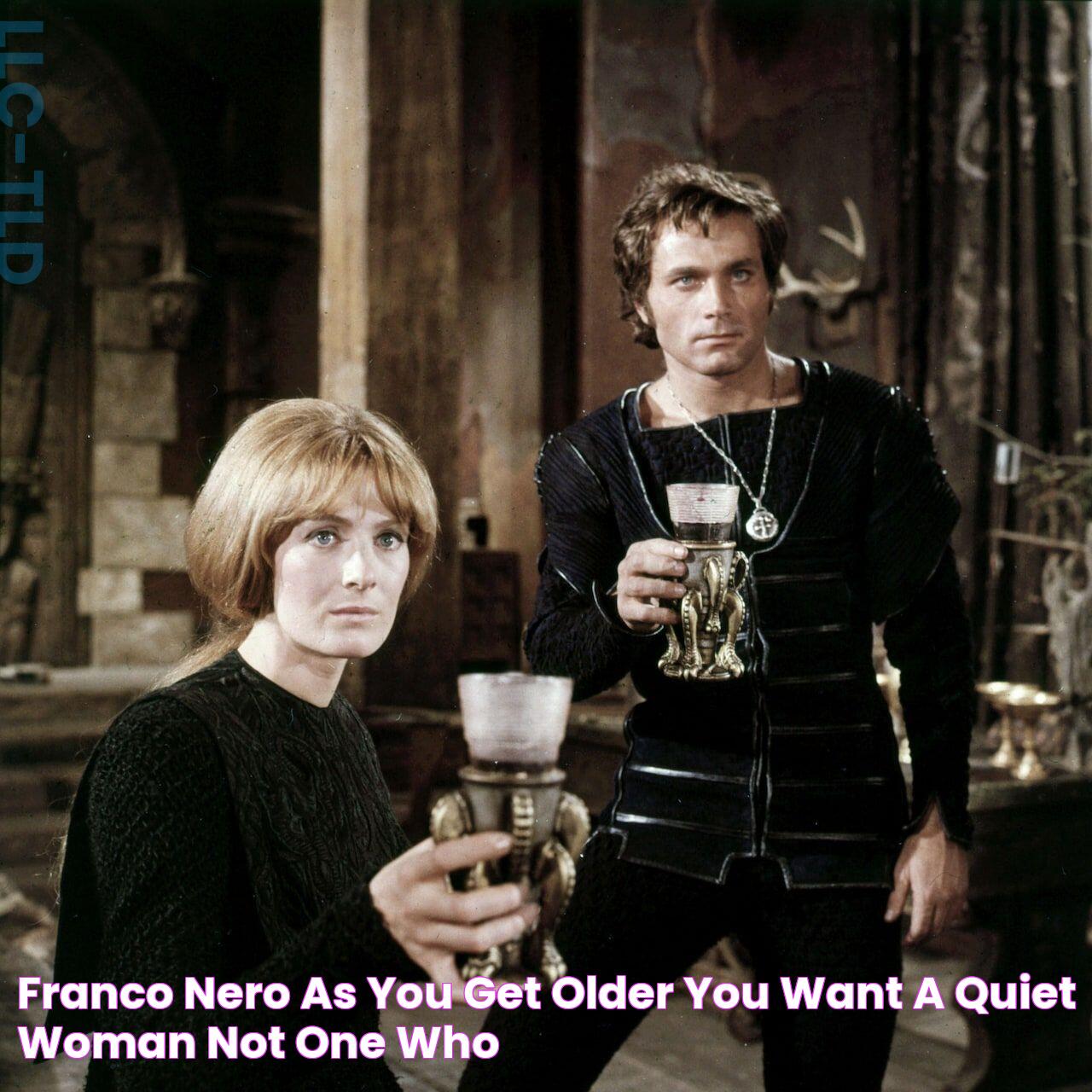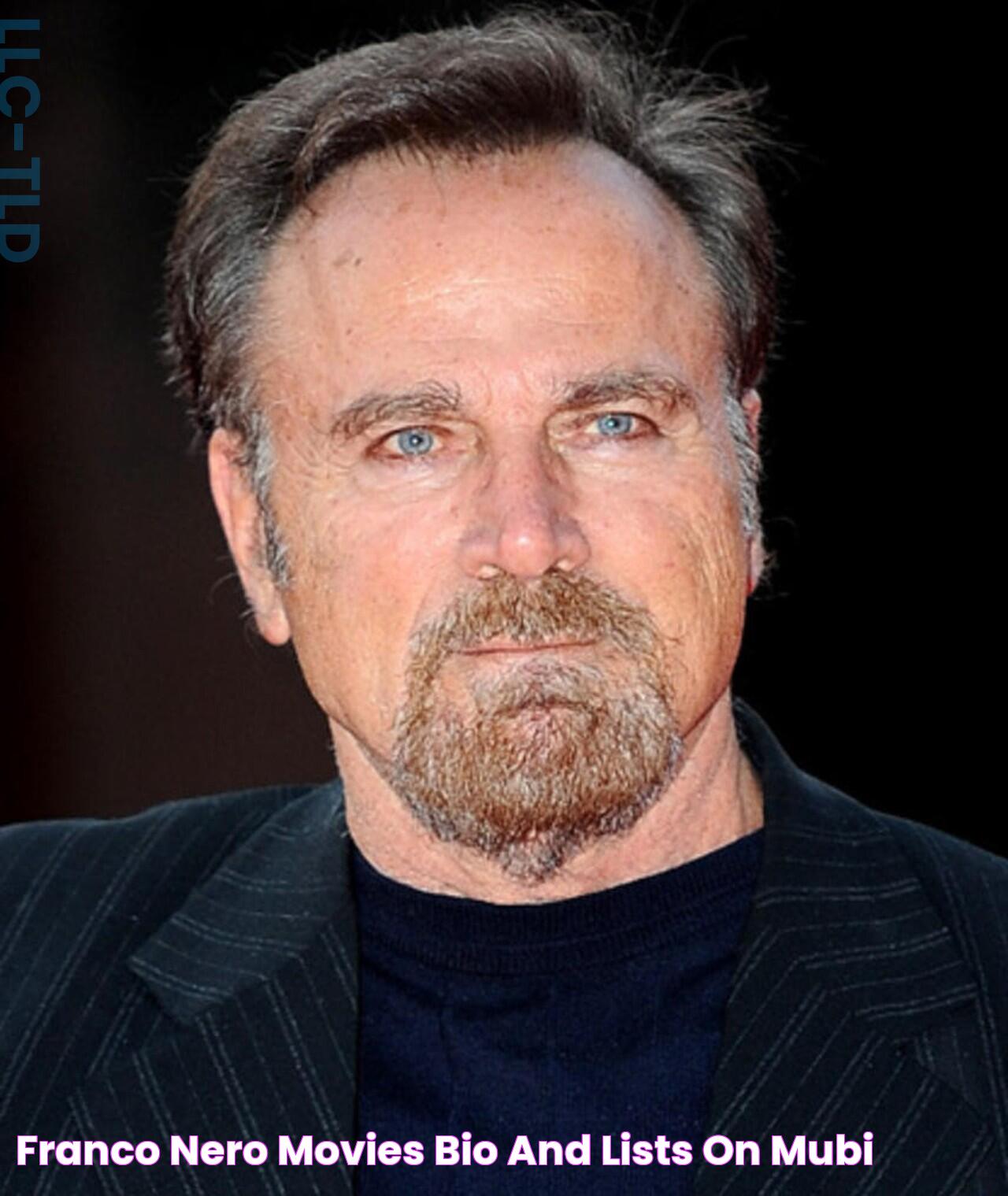Born in Italy, Franco Nero's ascent to fame began with his breakout role in the spaghetti western classic, "Django" (1966). This role catapulted him to international stardom and solidified his status as a leading man. Over the years, Nero has collaborated with a myriad of renowned directors, showcasing his ability to adapt to diverse roles and settings. His performances are often characterized by a unique blend of intensity and charisma, making him a standout in every project he undertakes. Beyond his on-screen achievements, Franco Nero's personal life and philanthropic efforts have also garnered attention. His marriage to actress Vanessa Redgrave is a testament to his enduring dedication to both his family and his craft. Franco Nero continues to inspire with his passion for storytelling and his commitment to artistic excellence, leaving an everlasting legacy in the world of cinema.
Table of Contents:
- Biography of Franco Nero
- Early Life and Education
- Breakthrough Role in Django
- Diverse Film Career
- Collaborations with Renowned Directors
- Franco Nero and Vanessa Redgrave
- Philanthropy and Personal Interests
- Legacy and Cultural Impact
- Franco Nero in Modern Cinema
- Frequently Asked Questions
- Conclusion
Biography of Franco Nero
Franco Nero was born on November 23, 1941, in San Prospero Parmense, a small village near Parma, Italy. He was christened as Francesco Clemente Giuseppe Sparanero, but later adopted the stage name "Franco Nero" for its memorability and simplicity. Growing up in post-war Italy, Nero faced numerous challenges but was deeply inspired by the arts from a young age. He pursued his passion for acting at the Piccolo Teatro di Milano, where he honed his craft and developed the skills that would later define his illustrious career.
Read also:Drake Know Yourself A Deep Dive Into The Life And Music Of A Global Icon
| Personal Details | Information |
|---|---|
| Full Name | Francesco Clemente Giuseppe Sparanero |
| Date of Birth | November 23, 1941 |
| Place of Birth | San Prospero Parmense, Parma, Italy |
| Nationality | Italian |
| Spouse | Vanessa Redgrave |
| Occupation | Actor |
Early Life and Education
Franco Nero's early life was marked by a profound connection to his Italian roots and a burgeoning love for storytelling. He was born into a family with modest means, yet his parents instilled in him the values of perseverance and creativity. Nero's formative years were spent in the picturesque countryside of Emilia-Romagna, where he was exposed to the rich cultural tapestry of Italy.
His educational journey began in local schools where he excelled academically. However, it was his involvement in school plays and community theater that truly ignited his passion for acting. Encouraged by his teachers and peers, Nero decided to pursue formal training in the dramatic arts, enrolling at the prestigious Piccolo Teatro di Milano. Here, he was mentored by some of Italy's finest thespians, laying the groundwork for his future success in the film industry.
Breakthrough Role in Django
The year 1966 marked a turning point in Franco Nero's career with the release of the film "Django." Directed by Sergio Corbucci, this spaghetti western introduced audiences to Nero's captivating portrayal of the titular character, a gunslinger caught in a web of vengeance and redemption. The film's gritty narrative and stylized violence resonated with audiences, propelling Nero to international fame.
"Django" was not only a commercial success but also a cultural phenomenon, inspiring numerous sequels and imitations. Nero's performance was lauded for its intensity and depth, showcasing his ability to convey complex emotions with subtlety. His portrayal of Django became iconic, cementing his status as a leading figure in the western genre and paving the way for future roles that would highlight his versatility as an actor.
Diverse Film Career
After the success of "Django," Franco Nero's career took off, leading to a diverse array of roles that showcased his range as an actor. He transitioned seamlessly from westerns to dramas, thrillers, and even comedies, working across various film industries including Hollywood, European cinema, and beyond. His ability to adapt to different styles and genres is a testament to his skill and dedication to his craft.
Some of Nero's notable films include "Camelot" (1967), where he portrayed the legendary Sir Lancelot, and "The Bible: In the Beginning..." (1966), in which he played the role of Abel. He also starred in the critically acclaimed "The Day of the Owl" (1968) and "Tristana" (1970), directed by the legendary Luis Buñuel. Nero's career is characterized by a willingness to take on challenging and unconventional roles, further endearing him to audiences and critics alike.
Read also:Hilarious Kanye Moments Caught On Camera A Look At Funny Pictures Of Kanye
Collaborations with Renowned Directors
Franco Nero's illustrious career is marked by collaborations with some of the most acclaimed directors in the film industry. His work with Sergio Corbucci on "Django" set the stage for future partnerships with visionary filmmakers who recognized Nero's talent and charisma.
One of his most notable collaborations was with director Elio Petri on the political thriller "Investigation of a Citizen Above Suspicion" (1970), which won the Academy Award for Best Foreign Language Film. Nero's performance in this film was praised for its nuance and intensity, solidifying his reputation as a formidable actor.
In addition to working with Petri, Nero has collaborated with directors such as Luis Buñuel, in the surrealist drama "Tristana," and Rainer Werner Fassbinder in "Querelle" (1982). These collaborations not only highlight Nero's versatility but also his ability to bring depth and complexity to the characters he portrays.
Franco Nero and Vanessa Redgrave
Franco Nero's personal life has been as captivating as his on-screen performances, particularly his long-standing relationship with actress Vanessa Redgrave. The two met on the set of "Camelot" in 1966, where Nero played Sir Lancelot and Redgrave portrayed Guinevere. Their chemistry was palpable, both on and off the screen, leading to a romantic relationship that would span decades.
Despite facing challenges and periods of separation, Nero and Redgrave's bond endured, culminating in their marriage in 2006. Their relationship is often celebrated as a testament to the power of love and mutual respect, with both actors continuing to support each other's careers and personal endeavors.
Philanthropy and Personal Interests
Beyond his achievements in film, Franco Nero is also known for his philanthropic efforts and personal interests. He has been involved in various charitable organizations, using his platform to advocate for causes close to his heart. Nero is particularly passionate about issues related to the environment and children's welfare, often participating in initiatives that aim to make a positive impact in these areas.
In his personal life, Nero enjoys a range of hobbies that reflect his diverse interests. He is an avid reader and has a deep appreciation for art and music. Nero's love for travel has also led him to explore different cultures and traditions, enriching his understanding of the world and informing his work as an artist.
Legacy and Cultural Impact
Franco Nero's contributions to cinema have left an indelible mark on the industry, influencing generations of actors and filmmakers. His iconic role in "Django" and subsequent performances have become part of the cultural lexicon, inspiring countless homages and references in popular culture.
Nero's legacy is not only defined by his filmography but also by his dedication to his craft and his ability to connect with audiences on a profound level. His work continues to resonate with viewers around the world, and his influence can be seen in the careers of contemporary actors who cite him as an inspiration.
Franco Nero in Modern Cinema
Despite having a career that spans over five decades, Franco Nero remains an active and relevant figure in modern cinema. He continues to take on challenging roles that showcase his enduring talent and commitment to storytelling. Nero's recent work includes appearances in films such as "The Lost City of Z" (2016) and "John Wick: Chapter 2" (2017), where he brought his signature gravitas and intensity to contemporary audiences.
Nero's ability to adapt to the evolving landscape of cinema is a testament to his versatility and passion for the art form. He continues to inspire with his performances, proving that his influence and legacy are as strong as ever.
Frequently Asked Questions
What is Franco Nero best known for?
Franco Nero is best known for his role as Django in the 1966 spaghetti western film of the same name. His portrayal of the titular character became iconic, cementing his status as a leading figure in the western genre.
Who is Franco Nero married to?
Franco Nero is married to actress Vanessa Redgrave. The two met on the set of "Camelot" in 1966 and have been together for many years, marrying in 2006.
Has Franco Nero won any awards?
While Franco Nero has not won major international awards, he has received numerous accolades and nominations throughout his career, including the Golden Globe for Best New Star of the Year - Actor in 1968.
What are some notable films Franco Nero has appeared in?
Some notable films Franco Nero has appeared in include "Django" (1966), "Camelot" (1967), "The Bible: In the Beginning..." (1966), "The Day of the Owl" (1968), and "Tristana" (1970).
What are Franco Nero's philanthropic interests?
Franco Nero is involved in various charitable organizations and is passionate about issues related to the environment and children's welfare. He often participates in initiatives that aim to make a positive impact in these areas.
Is Franco Nero still active in the film industry?
Yes, Franco Nero remains active in the film industry, taking on challenging roles and continuing to contribute to cinema. His recent work includes appearances in films such as "The Lost City of Z" (2016) and "John Wick: Chapter 2" (2017).
Conclusion
Franco Nero's career is a testament to his talent, versatility, and enduring influence in the world of cinema. From his breakout role in "Django" to his continued contributions to modern film, Nero has captivated audiences with his powerful performances and unwavering dedication to his craft. His legacy is not only defined by his filmography but also by his ability to inspire and connect with viewers on a profound level. As he continues to take on new roles and explore different facets of storytelling, Franco Nero remains a celebrated and iconic figure in the entertainment industry.

